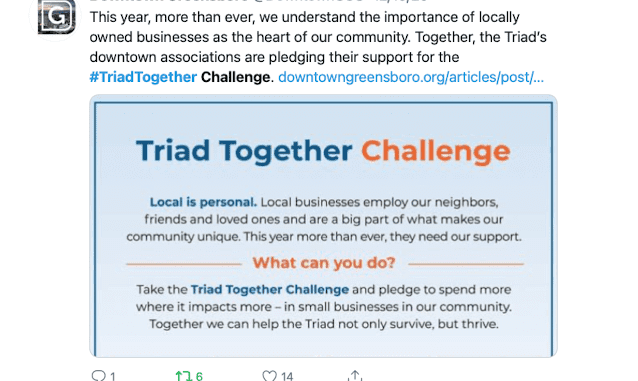
Small businesses across the country and across the state of North Carolina have suffered devastating economic losses due to COVID-19. While nearly every sector has been impacted, businesses involved in accommodations, food service and education, as well as nonessential retailers have experienced the most extreme effects, according to a study by McKinsey & Company consulting. For those small businesses that were already struggling, the pandemic has only accelerated their demise and resulted in permanent closures.
The U.S. Chamber of Commerce Small Business Coronavirus Impact Poll found that nearly 8 in 10 small business owners are concerned about the pandemic’s impact on their operations. While the federal government’s original Paycheck Protection Program closed in August, it is still issuing Economic Injury Disaster Loans and more help is on the way after Congress in December enacted another round of relief legislation to pump $900 billion into the economy in the months ahead. The assistance comes not a moment too soon, as according to a new poll by the U.S. Chamber of Commerce, one out of every four small businesses is on the brink of collapsing.
In response, a group of economic development leaders across North Carolina’s Triad region have banded together to urge residents, as well as their family and friends, to spend more of their money where it matters – here at home. The effort, dubbed the #TriadTogether Challenge is a cohesive, regional initiative to raise awareness and create a sense of urgency around the critical need to support locally owned businesses and restaurants, particularly as the COVID vaccine is believed to be slowly phased in over many months. Triad Together calls on members of the community to shop and eat locally, and to share their experiences by posting photos on social media (Facebook, Twitter or Instagram) using the hashtag #TriadTogether. The campaign kicked off in December, but organizers say it will likely continue into the spring.
Partners include the Alamance Chamber of Commerce, Burlington Downtown, Business High Point Chamber of Commerce, Downtown Elon, Downtown Greensboro, Inc., Downtown Winston-Salem Partnership, Forward High Point, Greater Winston-Salem, Inc., Greensboro Chamber of Commerce, Piedmont Triad Partnership, Wyndham Championship and Winston-Salem Open. Patrick Chapin, President and CEO of Business High Point Chamber of Commerce says that small businesses need all the support they can get from members of the community. “Let us not forget that ALL small businesses are hurting right now. Because dollars spent locally stay in our local economy (68 cents of every dollar) it is imperative that we support the businesses we have enjoyed for so long. Our dry cleaners, small boutiques, jewelers and others. These are our neighbors, and they need our help.”
“Our message is ‘Buy Local or Bye Local,’ and the community has responded positively.” — Mark Owens, president and CEO of Greater Winston-Salem, Inc.
According to challenge organizers, 97.9% of North Carolina businesses are small businesses, and 46% of North Carolinians work for small businesses. Round one of #TriadTogether was so successful, it caught the attention of the folks behind the Wyndham Championship golf tournament who decided to launch a phase two challenge (#WyndhamChamp #TriadTogether Challenge Giveaway). In this second stage, residents need only post a picture of themselves buying from a local restaurant or store using the #TriadTogether hashtag from a public account and tag and follow the Wyndham Championship to be entered into a drawing to win Wyndham Championship prizes. Tagging three friends in a post to encourage them to buy local will earn three extra entries. Prizes include Wyndham Championship hospitality tickets, autographed pin flags, Polo shirts and more.
Triad leaders say the pandemic has forced their communities to come up with innovative marketing solutions to try and help out local business owners. “We know nationally, since March, 17% of restaurants throughout the country have closed. I get the sense the number is smaller in High Point because our community has really rallied to support our local restaurants,” says Chapin. “We created the High Point Food Mob Facebook group that now has over 8000 members, the county and state have been as been supportive with grants and the restaurants themselves have been very innovative in providing safe service to their customers.”
Similarly, in Winston-Salem the Downtown Winston-Salem Partnership in partnership with Greater Winston-Salem Inc. has provided grants to small businesses. “Our downtown businesses have experienced unprecedented difficulties managing the impacts of this pandemic,” says Jason Thiel, President of Downtown Winston-Salem Partnership. “They have employee and customer safety considerations along with regulations that limit their ability to conduct business profitably so during the summer and fall we coordinated “The Streatery”, an on-street dining experience along Fourth Street and Trade Streets on weekends. We have also conducted marketing promotions such as “Shop the Block” and coordinated with city officials to offer restaurant pick up spaces in what used to be exclusively reserved for public on-street parking.”
Mark Owens, President and CEO of Greater Winston-Salem, Inc. says they crafted a compelling ad campaign of their own in order to make a strong statement. “We do not want to say goodbye to these independent establishments. Our message is ‘Buy Local or Bye Local,’ and the community has responded positively. The messaging has also sparked more conversations across the region about supporting local throughout the Triad.”
In Alamance County, Chamber of Commerce President Mac Williams says that in addition to joining the TriadTogether Challenge, they have created a special small business loan program for those especially impacted like members of the restaurant and hospitality spaces. He says that the grants started with $350,000 in seed capital (provided by private and public sources), and that using the Self-Help Credit Union as the loan administrator, there have so far been 13 loans approved representing over $230,000 in loan funds.
